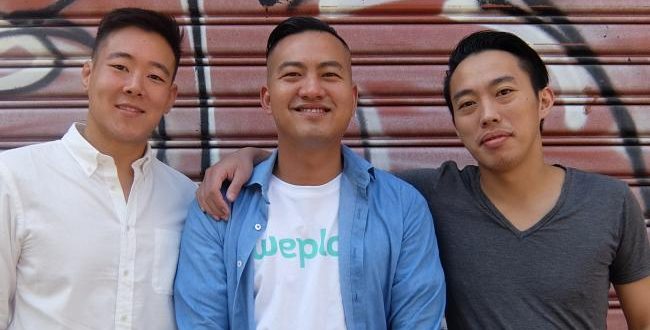Melbourne-based on-demand recruitment platform Weploy is launching today backed by a $1.5 million seed round and a heavyweight roster of advisers including the Rotten Tomatoes co-founder, the ex-Redbubble CTO, and agtech mogul Van Luong, who is responsible for 25 per cent of Vietnam’s shrimp market.
The young start-up has already signed on the likes of VICE Australia, RMIT and HotDoc as customers and head of growth Tony Wu told The Australian he has a big vision to change how the world views employment.
Launching alongside two co-founders Nick La and Vince Luong is what Mr Wu says is the world’s fastest, most cost-effective and reliable platform for employers to hire on-demand staff.
He said the business was started with a shared frustration of not being able to hire short-term employees, fast.
“We were working in totally different industries and doing different businesses, but we all had the same frustration,” Mr Wu said.
“This is a global problem we’re tackling aggressively.
‘‘And we have a single investor, so we haven’t had to dilute our vision at all.”
That single investor is Van Luong, the founder of shrimp organisation Viet-Uc Seafood Company, which is worth close to $1 billion and holds a quarter of Vietnam’s shrimp market.
Mr Wu said Weploy had turned down multiple investment offers from eager VCs and instead decided to work closely with Mr Luong, who poured an original seed investment of $400,000 into the business that was then quickly increased to $1m after the start-up’s successful pilot phase and positive market reception.
“Van’s got an amazing story; he came over here 35 years ago as an immigrant with nothing in his pocket,’’ Mr Wu said.
‘‘He started processing film and scaled that up through understanding the market to the point where he became the largest in Australia.
“The office we’re in is the office where he used to process the film.”
After a trip to Vietnam, Mr Luong engaged CSIRO in Australia to tackle that country’s shrimp-breeding problem, and is now a wealthy venture capitalist who helps tackle global problems through technology.
“His only condition to invest was that we see this as a global play and think big,” Mr Wu said.
“Unlike other situations he hasn’t set us micromanaged goals. It’s about us achieving our vision, which we’re doing.”
Joining Mr Luong on the advisory board are ex-Redbubble CTO Paul Coia, Rotten Tomatoes co-founder Patrick Lee and Australian financial expert Robert Krigsman of Krigsman Partners.
Mr Wu said on-demand platforms like Uber and Deliveroo had faced lawsuits over the fact they treated workers as contractors rather than employees, but said Weploy was determined to treat its workforce better.
“We didn’t want to go through that. Their workers aren’t being looked after, there’s often a bidding war for talent, no insurance, and no enterprise agreement,” he said. “They’re just getting paid the minimum wage and that’s not what we wanted.”
The executive said ‘‘Weployees’’ were paid at 10 per cent above industry award rates, and were employees of Weploy rather than contractors like other on-demand platforms.
“We really wanted to make sure the candidate gets looked after,” he said.
“They’re the ones working, it starts with them. We put them under a casual employment contract, so we can set the rate and look after them and pay their super for example.
‘‘We forfeit some of the margin; none of the other players are doing that. And from a client perspective, they’re paying 50 per cent less than they would through an agency.
‘‘It’s a huge differentiator.”
Mr Wu said the platform, which uses psychometric testing and close vetting to connect police-checked, pre-screened, on-demand talent with employers, wants to eventually become the global go-to for on-demand recruitment worldwide.
According to Mr Wu, the temporary staff services, business process outsourcing, employment placement and recruitment services industries are collectively worth more than $62.9bn to Australia’s economy, a fundamental cornerstone to the operation of core sectors.
“If I’m a Weployee in Australia, I want to be able to land in London and start accepting jobs,” Mr Wu said.
“Moving around countries without that fear of finding a job is important, we want people to work to live, not live to work. We really think people could chase their dreams worldwide through something like Weploy, we want to empower people to change how the look at employment.
“We’ve had a lot of interest already from five or six countries, they love the concept. We’ll be heading off to the rest of Australia pretty soon, then jumping into Asia; places like Vietnam, Hong Kong, and Singapore.”
The app, which is available in Melbourne with pilot testing under way in Sydney, is available today through the Apple App Store, with an Android version coming soon.
Reader comments on this site are moderated before publication to promote lively and civil debate. We encourage your comments but submitting one does not guarantee publication. We publish hundreds of comments daily, and if a comment is rejected it is likely because it does not meet with our comment guidelines, which you can read here. No correspondence will be entered into if a comment is declined.





